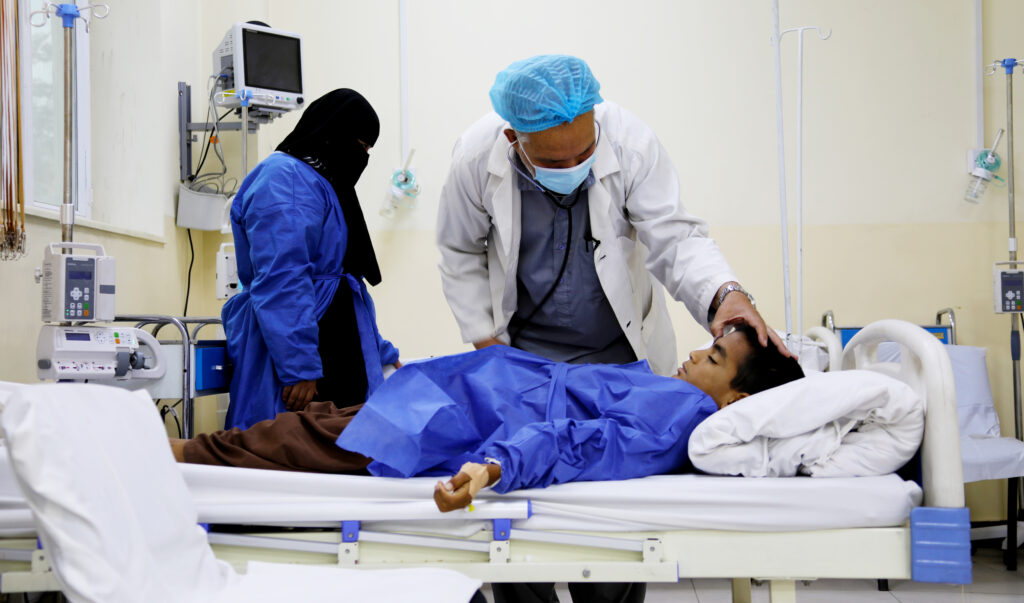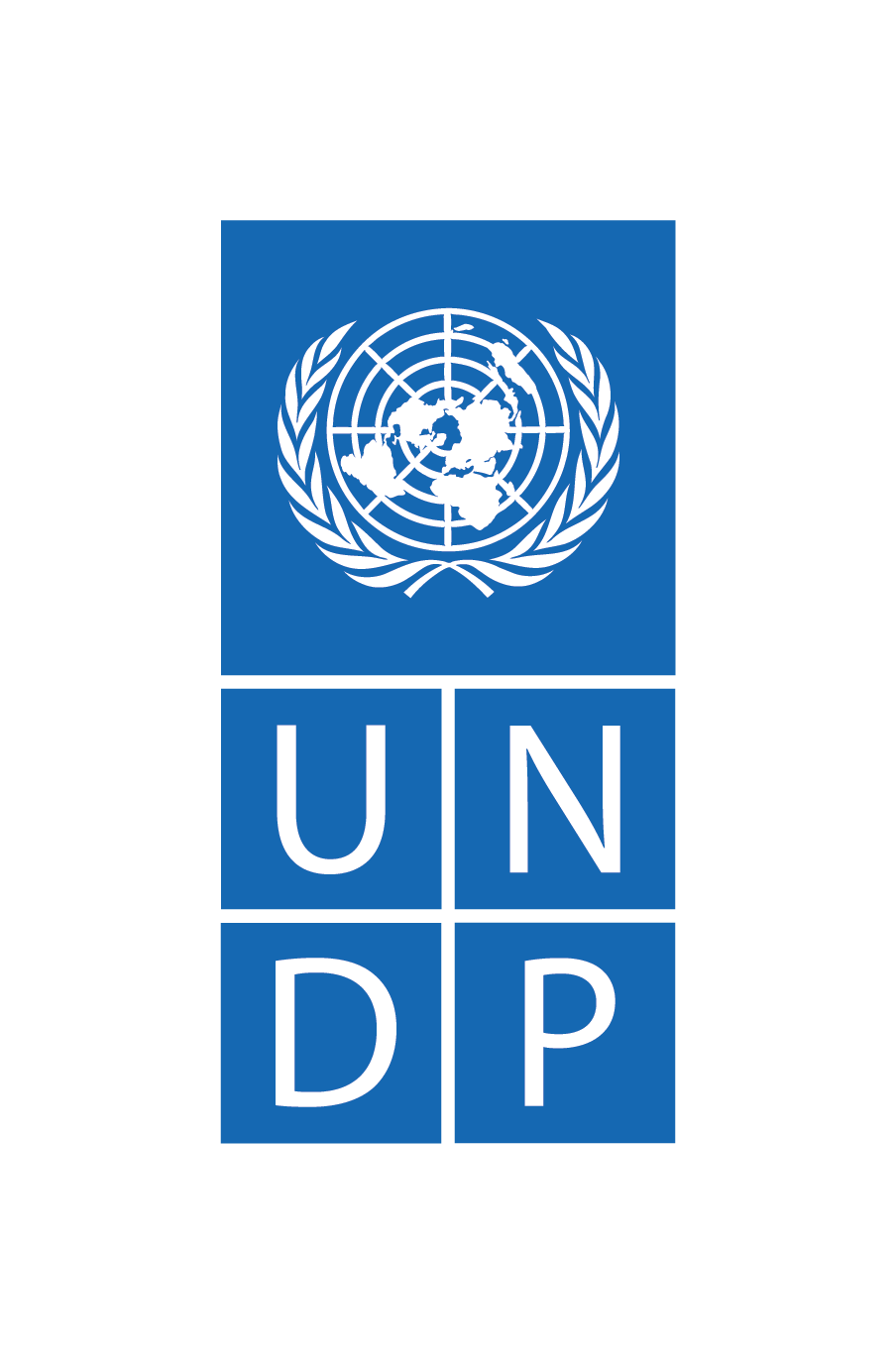Strengthening national systems for health: focus areas
Investments in resilient and sustainable systems for health lay the foundation for the effective and equitable delivery of HIV, tuberculosis (TB) and malaria programmes, other essential health services and the achievement of universal health coverage. As a key partner of the Global Fund to Fight AIDS, Tuberculosis and Malaria (The Global Fund), UNDP supports investments in strengthening systems for health. UNDP is increasingly requested by governments to provide technical assistance in core functional areas of health system strengthening, such as procurement and supply chain management or financial management systems.
These investments in building enabling processes, capacities and policy environments for health yield cross-cutting benefits in terms of improving health outcomes and advancing countriesʼ achievement of the health-related Sustainable Development Goals (SDGs). This includes e orts to enhance the sustainability and resilience of health systems that enable governments to accelerate progress towards universal health coverage and withstand the impact of global health crises and other emerging threats. The COVID-19 pandemic has underscored the vital role of health systems, revealing the costs of inadequate systems, processes and capacities as countries have had to cope with increased demands while maintaining the delivery of essential health services. The pandemic response has likewise illuminated the value of previous investments in building strong community systems for, for example, health, procurement and supply chain management systems, or health management information systems, which countries could adapt to mitigate the impact of COVID-19.
This section outlines the key focus areas in which UNDP works with governments, the Global Fund, the World Health Organization and other health and development partners to build resilient and sustainable systems for health. This includes guidance and examples based on UNDPʼs experiences supporting country systems in the areas of : i) health management information systems; ii) procurement and supply chain management; iii) financial management; iv) human resources for health; and v) community systems strengthening, as well as cross-cutting investments in vi) anti-corruption, transparency and accountability, vi) environmental sustainability and vii) harnessing innovation and digital solutions for health.
Key areas for building resilient and sustainable systems for health
- The Global Fund’s Modular Framework Handbook underlines the following key areas for investment in resilient and sustainable systems for health:
- Health product management and systems strengthening. This includes policy strategy and governance; storage and distribution capacity; procurement capacity; regulatory and quality assurance support; and avoidance, reduction and management of health-care waste.
- Health management information systems and monitoring and evaluation. This includes routine reporting; programme and data quality; analyses, evaluations, reviews and transparency; surveys; administrative and finance data sources; and civil registration and vital statistics.
- Human resources for health including community health workers. This includes education and production; remuneration and deployment; in-service training; and policy and governance frameworks.
- Integrated service delivery and quality improvement. This includes quality of care; service organization and facility management; and service infrastructure.
- Financial management systems. This includes public financial management systems and routine grant financial management.
- Health sector governance and planning. This includes national health sector strategies and financing; and policy and planning for national disease control programmes.
- Community systems strengthening. This includes community-based monitoring; community-led advocacy and research; social mobilization; building community linkages and coordination; and institutional capacity building, planning and leadership development.
- Laboratory systems. This includes national laboratory governance and management structures; infrastructure and equipment management systems; quality management systems and accreditation; information systems and integrated specimen transport networks; and laboratory supply chain systems.
Examples
Case Study: Building Resilience Against Health Crises Through Long-Term Investments in Health Systems
In 2020, the simultaneous threats of malaria, Ebola, and COVID-19 placed immense strain on Burundi’s healthcare system. Since 2017, UNDP, with funding from the Global Fund, has supported the Ministry of Health in scaling up programs, procuring essential medical supplies, and strengthening supply chains. Key interventions included distributing 6.8 million bed nets, deploying mobile clinics, and conducting insecticide spraying in high-risk areas. Investments in health infrastructure and medical equipment enhanced Burundi’s ability to respond to emerging outbreaks. The national health crisis center, originally established for Ebola, became the coordination hub for COVID-19, equipped with 200 smartphones and laptops. Additionally, malaria control pumps were repurposed for medical decontamination, and a health monitoring app was adapted to track COVID-19 cases.
These efforts not only controlled disease outbreaks but also fortified Burundi’s healthcare system, ensuring life-saving medicines and diagnostic tools reached even remote communities. By strengthening disease surveillance and response capacity, Burundi reduced malaria-related deaths and enhanced its resilience against future health crises, protecting millions of lives.
Case Study: Building resilience through strengthened ICU care

In Afghanistan, Intensive Care Units (ICUs) play a crucial role in providing emergency care, particularly in regions affected by conflict, disasters and public health crises. With support from the Global Fund, UNDP upgraded ICUs in Kandahar, Logar, and Balkh provinces, enhancing emergency care and infectious disease treatment for over 500 patients monthly. These improvements included renovating ICU wards and installing oxygen plants that deliver oxygen directly to patients’ beds while also generating backup supplies in cylinders. These measures enable the ICUs to provide intensive care services to patients in need.
These investments provide the infrastructure, equipment and healthcare capacity to improve critical care, manage infectious diseases and chronic illnesses, improve maternal and neonatal health and respond to emergencies and disasters. Crucially, this also ensures a more integrated healthcare network, enabling telecommunication links between departments and boosting the long-term readiness of facilities to respond to crises. With hundreds of patients now receiving care each month from the upgraded ICUs, this approach helps safeguard communities, bolster health systems and build resilience against future health emergencies.
